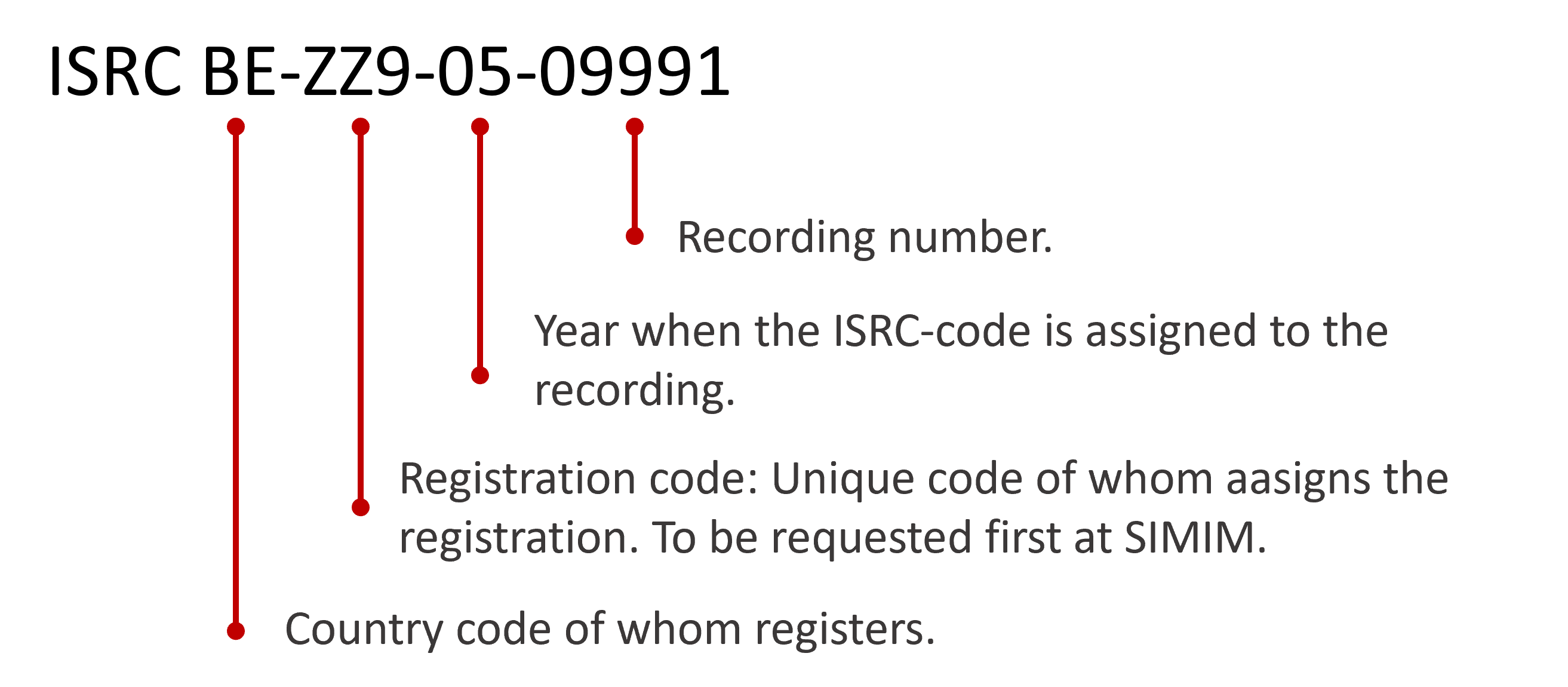ISRC
The ISRC (International Standard Recording Code) is a unique identification of the audio and audiovisual recordings. This code allows recordings to be uniquely identified worldwide. Through this unique identification, the recording used and the rightholder can be easily identified. This allows to simplify administrative work:
- the repertoire used can be more easily reported by large users such as radio and TV stations.
- based on this code, the recordings can be identified more easily.
- the rightholders can be found more quickly.
The key to this identification is the unique code of the person who provides the registration ('registration code'). For the Belgian and Luxemburg territory, this code can ONLY be obtained from SIMIM.
Composition of the code:
The full ISRC code consists of 12 characters. They represent the country of the person who provides the registration (2 characters), the unique code of the person who provides the registration ('registration code') (3 characters), the reference year (2 characters) and the recording number (5 characters).
Example:

Procedure:
- Anyone who registers the recordings must apply once for a 'registration code' from his local ISRC agency. In Belgium, this is SIMIM.
- For each recording the registrant must compose an ISRC code in the following manner:
- Country code: BE
- Registration code
- Reference year: the last 2 figures of the year in which the ISRC-code gets assigned to the recording
- Recording number: This number must consist of 5 digits (if necessary front supplement with zeros). This number must be UNIQUE within the registration year. The person who makes the registration can work out a numbering at his own discretion.
- All ISRC codes used must be stored together with additional identification information about the recordings in a register/database and must be communicated to SIMIM.
ISRC vs. Mandate:
- ISRC codes and neighboring rights are 2 separate cases. Just because you're using an ISRC code doesn't mean you're automatically given neighboring rights.
- First, your work must be 'used' (e.g. broadcast on radio or TV station) to generate rights.
- You must give a mandate to SIMIM to receive these neighboring rights. Not all companies that grant ISRC codes choose to take care of the administration themselves for the neighboring rights. In addition, the rights are sometimes transferred contractually, so that the registrant of the ISRC codes is not always the rightholder.
- If you wish to receive your neighboring rights, you must also give a 'mandate' to SIMIM. You can mention in your ISRC application immediately if you also wish to receive documents in order to assign us your mandate.
Additional information:
Detailed information can be found on the IFPI website.
Request a registration code:
If you want to start producing music recordings and do not yet have a registration code, you can apply for them on isrc@simim.be.
List in the subject line 'Request ISRC' and provide the following information:
- Company name (if you don't have a company, fill in the text NATURAL PERSON)
- Contact person
- Address
- Phone
- VAT number
- Company number (if you don't have a company, fill out your NATIONAL REGISTER NUMBER)
You will be assigned the 'registration code' free of charge. The processing and validation of your request can take a few days. However, you must strictly comply with the prescribed procedure.
We invite you to user our online ISRC request form.



